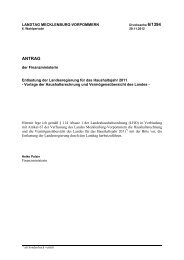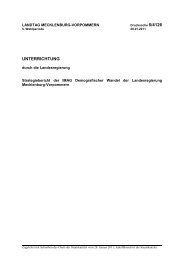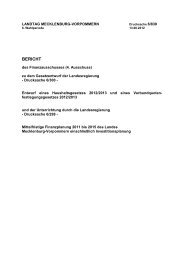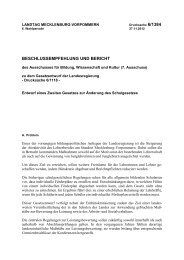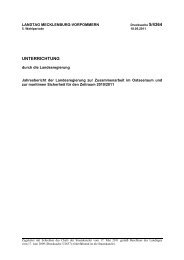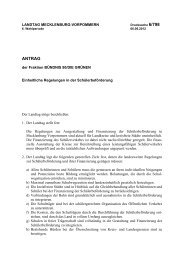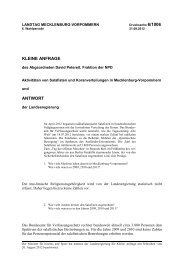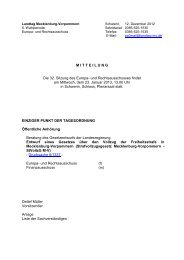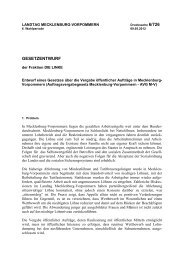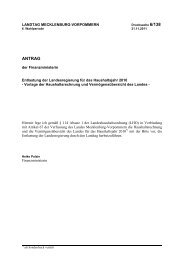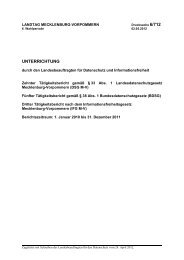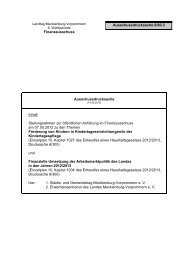Baltic Rim Economies - Baltic Port List
Baltic Rim Economies - Baltic Port List
Baltic Rim Economies - Baltic Port List
Create successful ePaper yourself
Turn your PDF publications into a flip-book with our unique Google optimized e-Paper software.
Expert article 862 <strong>Baltic</strong> <strong>Rim</strong> <strong>Economies</strong>, 21.12.2011 Quarterly Review 5�2011<br />
Maritime situational awareness across borders<br />
By Veli-Jukka Pennala<br />
The EU strategy for the <strong>Baltic</strong> Sea Region was adopted in<br />
October 2009. The strategy focuses on questions related to<br />
environmental and economic cooperation but nevertheless, the<br />
security perspective is also clearly present. Security, alongside<br />
with environment, economics and accessibility, is one of the<br />
four cornerstones of the implementation plan. To quote the<br />
strategy: “other forms of development will be insufficient or<br />
even totally impossible without a sense of security and<br />
confidence in maintaining the general order”.<br />
The concept of maritime security can be divided into naval<br />
safety and other forms of security. Under the concept of<br />
security you will find measures for fighting criminality across<br />
borders as well as actions taken to prevent piracy. Military<br />
actions to prevent territorial violations and to repel naval<br />
attacks are the extreme manifestations of the concept of<br />
security. According to this kind of classifications the<br />
responsibilities for different aspects of security can easily be<br />
divided to various authorities. However, the dynamics of<br />
different events do not necessarily respect the boundaries of<br />
the security concept or the responsibilities between authorities.<br />
Therefore we need well-functioning co-operation across the<br />
administrations both nationally and internationally.<br />
Feeling secure starts with situational awareness.<br />
Maritime surveillance is the fundamental cornerstone of<br />
maritime situational awareness. This statement also appears in<br />
the integrated maritime policy of the European Union. One of<br />
its objectives is to create a European maritime surveillance<br />
network to secure safe use of the seas and to protect the<br />
maritime borders of Europe. Practical solutions, in addition to<br />
technical arrangements, are the efforts in favour of more<br />
efficient civil-military cooperation as well as the removal of<br />
juridical obstacles that limit the exchange of information.<br />
In Finland we have a good tradition of cooperating between<br />
the maritime authorities. Since 1994 Finnish Navy, Frontier<br />
Guard and Maritime Administration have worked closely<br />
together within so called METO-cooperation (Maritime<br />
Environmet Triauthority Operations). Few years ago, due to<br />
reorganization of the traffic administration, the Maritime<br />
Administration was replaced in the METO context by Finnish<br />
Transport Agency and Finnish Transport Safety Agency, thus<br />
increasing the number of key actors from three to four. These<br />
“main performers” also have connections of their own to other<br />
maritime actors, such as harbours, the Police, Customs and<br />
Environmental Administration just to mention few. Due to small<br />
resources and the small size of our country, the Finnish<br />
maritime actors have always strived to cooperate, but thanks<br />
to METO this cooperation has achieved a formal structure and<br />
position within the organisations.<br />
The most essential METO-product, its flagship, is the<br />
nation-wide recognized maritime picture, maintained by the<br />
Navy. It contains data produced by the sensors of all three<br />
authorities (AIS, radar, camera, senses). The technical<br />
realization includes hundreds of logical connections between<br />
offices and sensors. However, the concept of maritime<br />
situational awareness means more than mere sensor<br />
information. The excellence of the METO cooperation lies in its<br />
entirety. It is not just a row of technical solutions, but a way of<br />
working together. The advantages of METO-cooperation have<br />
also been noticed by others both nationally and internationally.<br />
The METO-cooperation has become a model example of how<br />
you get the administrative branches of three different ministries<br />
to strive towards the same goal instead of competing for the<br />
resources. The efforts have been successful. The cooperation<br />
has improved the maritime situational awareness and at the<br />
11<br />
same time provided direct financial savings for more than 50<br />
million euros.<br />
Having such good experiences it was only logical to<br />
continue the national cooperation by looking across our<br />
borders, at first concentrating on the <strong>Baltic</strong> region. We started<br />
cooperating with the Swedish Navy in 2001 under the name<br />
SUCFIS (SUrveillance Cooperation FInland Sweden).Thanks<br />
to good experiences gained through this cooperation, we felt<br />
encouraged to take the next step together with the Swedish<br />
Navy and invited all the <strong>Baltic</strong> countries, essential maritime<br />
authorities and organisations to a seminar in September 2008,<br />
where the SUCBAS initiative, i.e. maritime surveillance<br />
cooperation covering the entire <strong>Baltic</strong> sea, (SUrveillance<br />
Cooperation BAltic Sea) was introduced. In its present state<br />
SUCBAS consists of an intensive cooperation group, including<br />
eight nations. The group has been operational since 2009. On<br />
the initiative of Finland the SUCBAS model was developed<br />
further to serve as a base for the MARSUR-project (MARitime<br />
SURveillance) led by the European Defence Agency (EDA).<br />
The target of this project is to enable the exchange of<br />
information between European navies. The brilliantly working,<br />
technical solution was presented in Brussels on 30 June 2011.<br />
International cooperation has taught us that it is easier to<br />
achieve a technical solution than to reach other agreements. In<br />
addition to good will, national political processes including<br />
preparations for agreements are needed. The target is<br />
cooperation on a multi-authority basis, also internationally.<br />
Today, at EU-level “cross sector”thinking involves more<br />
challenges than “cross boarder”thinking. The central maritime<br />
agencies (EDA, FRONTEX and EMSA) each have their own<br />
maritime surveillance projects that naturally spring from the<br />
individual needs of each agency. One objective (and strategic<br />
instrument) of the EU-integrated maritime policy led by DG<br />
MARE is to combine the information produced by different<br />
agencies into “a European situational awareness picture”. This<br />
objective has good chances of succeeding, especially thanks<br />
to the Lisbon Agreement, which helped eliminate, at least in<br />
the agreement texts, the pillars separating the civilian and<br />
military structures in the EU. In Finland this problem has been<br />
solved already on a national level, which is not the case even<br />
in all <strong>Baltic</strong> countries.<br />
”Need to know, need to share” is the slogan of the<br />
SUCBAS cooperation. On a national level, we have been<br />
aware of this already for a long time. The keyword in every<br />
respect is “trust”. Especially when international cooperation is<br />
concerned, trust does not develop immediately, but only as a<br />
result of deeds and actions. The global era is unfortunately<br />
more difficult to foresee, it is more chaotic and presents new<br />
and different threats. Good situational awareness is<br />
increasingly important and if you stand alone as a state, this<br />
awareness is no longer achievable. As a Navy we stand at the<br />
leading edge when it comes to developing maritime situational<br />
awareness across boarders.<br />
Veli-Jukka Pennala<br />
Rear Admiral, Commander<br />
Finnish Navy<br />
Finland<br />
� Pan-European Institute � To receive a free copy please register at www.tse.fi/pei �



